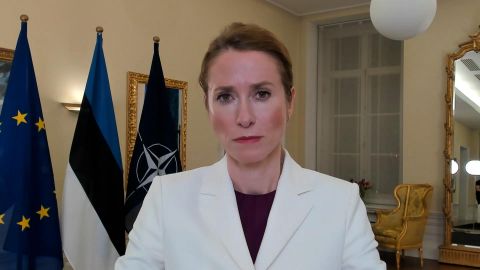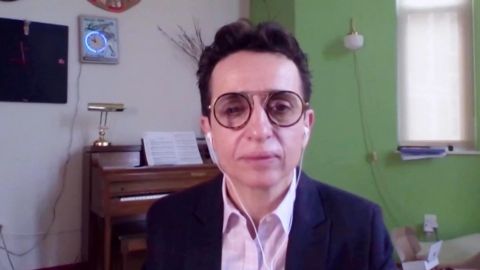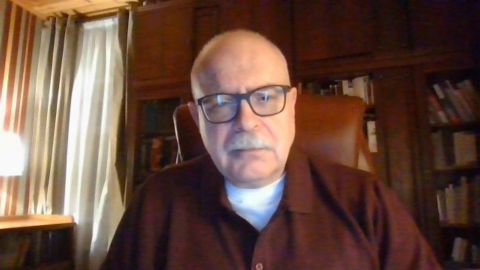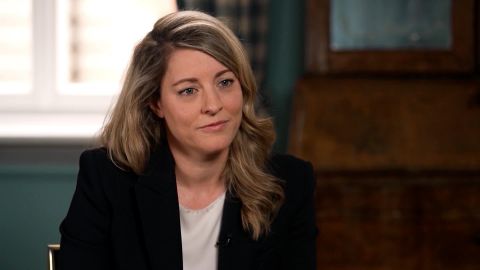Read Transcript EXPAND
CHRISTIANE AMANPOUR: Continuing our coverage on Ukraine now. Journalist Masha Gessen’s latest article in the “New Yorker” tells the story of residents on the Ukraine-Russian border, where locals talk of misleading propaganda and language divides. He sat down with Hari Sreenivasan to discuss the current situation, and what the media gets wrong about Vladimir Putin.
(END VIDEO CLIP)
HARI SREENIVASAN: Christiane, thanks. Masha Gessen, thank you so much for joining us. So, we are now past the point of semantics, of whether or not it’s an invasion. What is now happening is explicit versus the last eight years where Russian forces were surreptitiously invading Ukraine. Is there a difference today when you hear the president of the United States say that an invasion has begun?
MASHA GESSEN, AUTHOR, “SURVIVING AUTOCRACY”: Yes, there’s certainly a different. And I’m glad you’re framing it that way because a lot of the time, we hear American politicians and Western politicians talking about an imminent invasion as though Ukraine hadn’t been contending with the Russian invasion and the Russian occupation of Crimea over the last eight years. That is a shooting war that has claimed casualties almost daily. But what we’re facing, judging from Putin’s speech on Monday is something on a much greater scale, with their project of changing the regime in Kyiv.
SREENIVASAN: Is this partly to show how weak the West is? I mean, in a way, nation after nation have tried to book appointments with Putin and tried to get him to talk with them. But here he is, able to carry out his plan, besides the fact that we have essentially forecast what he was going to do to the world.
GESSEN: I think that this is Putin’s — he feels like this is his hour. And this is something that he has been preparing for, in one way or another, for the last 23 years. The reference point here is the air war in Kosovo in 1999. In 1999, a U.S.-led alliance of NATO forces, without the sanctions of the U.N. Security Council started bombing first Kosovo and the rest of Yugoslavia in order to get then President Slobodan Milosevic to withdraw Serbian military and police from Kosovo, and effectively give Kosovo autonomy. It then became an independent country in response to sustained violence against ethnic Albanians in Kosovo. What Putin has been — and what happened then was basically, the message that Russia got was that in the post-Cold War order, international law was for the weak and Russia was weak. And the fact that NATO bombed without not only receiving but even seeking a resolution in the Security Council of the United Nations, and made it very clear to Russia by the prime minister at the time, (INAUDIBLE), on his way to the United States for negotiations. It was made clear to him that he didn’t have a say in a what was going to happen with Serbia and with Kosovo. Russia was put in its place. It was a profoundly humiliating experience. But it was also an experience of learning that in the new world order, in a unipolar world, the United States was going to do what it felt was right, not what was legal, not what was on paper. And that actually, believe it or not, came as a shock.
SREENIVASAN: So, if he has that in the back of his mind or in the front of his mind that, listen, NATO didn’t have to ask permission and here’s what they were able to do to Belgrade, does he use that in a way as justification for doing the same thing to Kyiv, or having this invasion, saying, you know what, we are back on the world stage, we are a power, we are not as irrelevant as you think?
GESSEN: So, there are two things are happening. One is Putin is very clearly sort of — it’s — I don’t even know what to call it, it’s like a cosplay of Kosovo, that everything that was in place in 1999 is being imitated in 2022. Putin has been throwing around the word genocide after his press conference with Olaf Scholz, the German chancellor, I believe, they filled a complaint in the U.N., alleging genocide against ethnic Russian and Russian speakers in Ukraine. There’s absolutely no evidence for this. They have recognized these manufactured separatist regions in a symmetrical move to what the United States and allies were doing with Kosovo. And so, they’re saying, look, here they are, there’s a separatist movement, there are breakaway regions and there’s sustained ethnic violence, we’re alleging there’s genocide. So, now, we’re going to intervene and force regime change, just like the Americans did with Kosovo. The other thing is going on is I think there’s a genuine desire to create a bipolar world again. You assert that Russia is a world power that it will behave exactly as the other world power does. But also, yes, to put the NATO in its pace, to put the West in its place. It’s like, OK, you didn’t ask us, we’re not going to ask you. And you what, we were helpless to do anything about Serbia at the time, and you’re helpless to do anything about Ukraine now.
SREENIVASAN: Is primarily a response with just economic sanctions going to have any of the deterrent effects that the West thinks? This is a former KGB agent. I’m sure that he’s though through what are the consequences. Doesn’t he just plan for this and say, all right, so my buddy oligarchs are going to have a tough day, and some more banks are going to frozen, so what?
GESSEN: In his speech on Monday, Putin said, the West will impose sanctions on us no matter what, whether we go to war or we don’t go to war, they’re going to use sanctions. Because, of course, the whole world is against us, that’s the message. The West, the United States and European countries act like an insane person with sanctions. An insane person who keeps doing the same thing, expecting different outcomes. Sanctions have not worked as a deterrent or a way to force Russia to change its behavior in the last — you know, how long have there been sanctions? I think it’s going on 15 years. And they never act — they never function as a deterrent. So, continuing to frame them as a deterrent is counterfactual. That doesn’t mean that there shouldn’t be sanctions, right? Sanctions are probably the right thing to do. It is wrong for the West to be enablers of Putin’s aggression. It is wrong to do business with Putin. It is wrong to give Putin and his cronies access to western financial networks, because that is in fact enabling. But that’s a very different way of thinking than saying, this is going to act as a deterrent. And it affects the way that sanctions are imposed, right? This whole idea that they will be imposed gradually, you know, this is the first tranche, then if he behaves even more badly, we’re going to impose a second trend is insanity because that has never before and it will not work now. Putin is not afraid of sanctions because he’s not afraid of his population getting poorer. It’s not going to affect him personally. And it’s not — and this is a trope that, again, is a kind of insanity, because there’s no evidence for it. The trope that Putin’s inner circle is going to rebel against him because they will feel financially squeezed. They feel financially squeezed together, and they depend on Putin and their closer to Putin to be less financially squeezed. So, there’s no possibility of solidarity in those circumstances.
SREENIVASAN: Has this made him stronger or weaker?
GESSEN: I think that, what we know from history, is that totalitarian leaders actually benefit from widespread hardship. When people are worried about survival, they fear change. They — and they don’t — they just don’t have time and energy to think about whether they’re being governed well. They’re really just worried about getting the next meal on the table for their families. So, in a very poor economy, in general, has strengthened totalitarian regimes.
SREENIVASAN: What does Putin not understand about the Ukrainian people or what is he taking for granted here?
GESSEN: So, I think there are two parts to Putin’s plan. Or in fact, In Putin’s plan, there’s in fact one part, which is a (INAUDIBLE) force. I think he is — he has plentiful information about his own military, and probably quite a bit of information about the Ukrainian military, and knows he can overwhelm the Ukrainian defense forces. What I think he doesn’t understand, he can’t understand is just what kind of resistance he is going to get from Ukrainian society. I think an attempt to install a puppet regime in Kyiv will draw is going to draw an extraordinary amount of resistance. I mean, we’re talking about a country that has built a contemporary mythography on being — people being willing to die for their freedom, not on one, not on two, but on three different occasions. There have been two revolutions in Ukraine. The revolution, the Revolution of Dignity in 2013 and 2014. People stayed in a central square in Kyiv through the dead of winter, day and night, and they stayed there when the government opened fire on them. And so, this idea that they won their freedom, they won their basically functioning democracy, right, with lots of flaws, but a functioning democracy. They won it through the loss of life, and through being willing to sacrifice their lives. That’s not just a story, that’s a lived experience of history from the Ukrainians. And to that, the popular resistance to the Russian invasion. The Ukrainian military basically dissembled in the face of the unexpected Russian invasion in 2014. And people, you know, (INAUDIBLE), young historians, (INAUDIBLE) students, journalists, volunteered to fight for their country. And many, many more people, hundreds of thousands, possibly millions of people were part of this incredible effort to get supplies to the front, to get food, to get blankets and clothes to the people that were being displaced. This a volunteer effort of an incredible scale that lasted several years. So, we’re talking about the kind of civic cohesion (ph) that, I think, is difficult for us in the United States to imagine and it’s certainly possible for Putin to imagine. And his experience, the threat of forces is effective against even his bravest opponents.
SREENIVASAN: You picked up on something that he started to say in his speech the other night, and that was really kind of questioning the underpinnings, the sort of legal basis for the disillusion of the Soviet Union, which has, I think, bigger implications than just Ukraine.
GESSEN: Honestly, that is the most shocking part of his speech to me. What he talked about was that Russia has always been a unitary state. It has always been a centralized empire. And that the soviet laws, which on the basis of which the Soviet Union was dissolved in 1991. The Soviet laws that are on paper gave every constituent republic the right to secede. And on paper, the Soviet Union was a federation. It was a federation of independent states. He is right that it was never actually governed as one. That until 1991, that was the legal fiction, and then suddenly, those laws were enforced. But what he is saying is that the legal fiction was never legitimate. And therefore, the dissolution of the Soviet Union, it was not legitimate. So, he is creating this whole new narrative of Russian imperial history as it continues, without a recognizable legal change in October of 1917, after the Bolshevik Revolution, when the Empire technically stopped existing and then, was reconstituted as a federation. He is saying, no, it’s been a unitary empire all along. And that means that he is refusing to recognize the dissolution of the Soviet Union, but really is reserving the right to claim any land that belonged to the Russian Empire that puts not only places like Kazakhstan and other Central Asian countries unnoticed, but the Baltics, Finland, Poland, right? This is Putin announcing that Russia is now an expansive power that does not recognize the current map of Europe.
SREENIVASAN: I want to also ask a question about what this does in American political terms. Because we’ve seen the right and conservative wing in the United States essentially praise Putin throughout this. We had — I’m just going to look at notes here — Mike Pompeo, who said on Fox News said in January, Putin is a talented statesman, he has lots of gifts. He was a KGB agent for goodness sakes. He knows how to use power. We should respect that. And just the other night on Tucker Carlson, on his show, said, what is this really about? Why do I hate Putin so much? Has Putin ever called me a racist? Has he threatened to get me fired for disagreeing with him? Has he shipped every middleclass job in my town to Russia? Is he teaching my children to embrace racial discrimination? Is he making fentanyl? Is he trying to snuff out Christianity? Does he eat dogs? I mean, there seems to be a different threshold for how we perceive Russian aggression if you are a member of the American Republic Party. 62 percent of Republicans who say that Putin is a stronger leader than Biden.
GESSEN: This is terrifying. I mean, we’re in uncharted territory in American politics where we don’t have the two parties arguing about strategy, we don’t have the two parties arguing about values or what strategy is a better expression of agreed-upon values, which is really, you know, the way that we’re used to seeing American politics. You know, that Tucker Carlson monologue is really about viewing politics in an entirely different way. Seeing it as always transactional, always a function of personal grievances, and never having anything to do with values, right, or with law, or any of the things that we rely on to create a common political space. And so, this crisis in Europe has also forced or is forcing a reckoning with what’s happened to American politics, right? The party that is not in power, the Trump-led Republican Party has refused to recognize the Biden administration as legitimate. Which is a very different idea than the things that they’re doing are bad, and we disagree with them, right? If the administration is illegitimate, then everything it does is illegitimate. Its entire politics belongs in the trash sheet. And that is their starting point, which is, of course, why they’re saying is not an argument in substance, but an entire — a complete rejection of everything the Biden administration is doing in this situation.
SREENIVASAN: Marsha Gessen, thanks so much for your time.
GESSEN: Thank you for having me.
About This Episode EXPAND
Experts offer analysis of the crisis in Ukraine.
LEARN MORE



